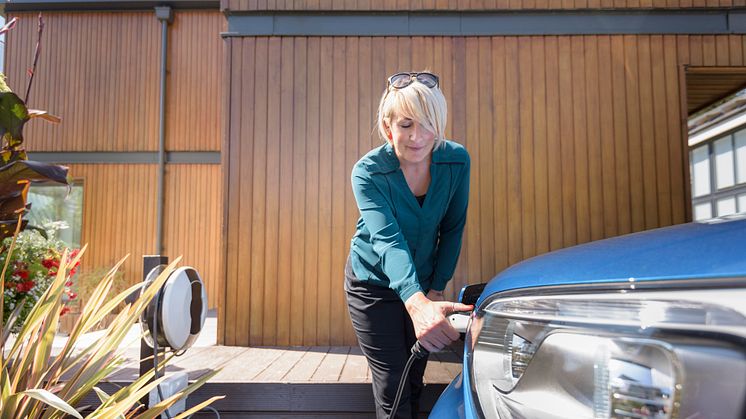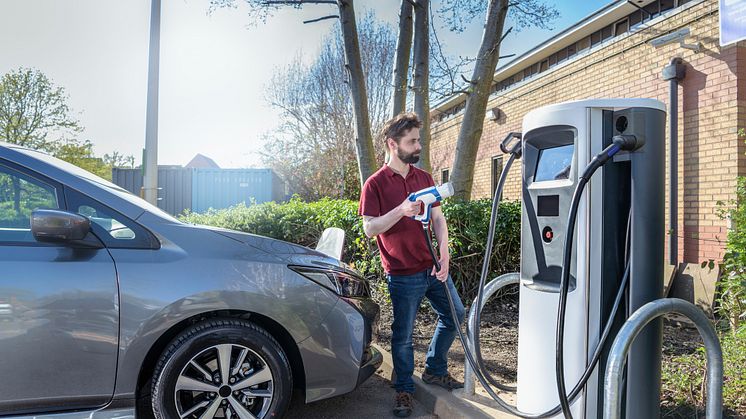
Press release -
Electric vehicle charge points at supermarkets double in two years
The number of electric vehicle (EV) charge points at supermarkets has doubled in the last two years, according to data analysed by Zap-Map and the RAC*.
Some 542 EV charger units were installed by supermarkets from the end of October 2017 to the end of 2019, taking the total on their sites to 1,115 – a growth of 95%. This means 6.5% of all the UK’s public charge points are located at supermarkets with growth in-line with the overall growth of public charge points.**
The number of stores offering charging facilities has also doubled with 608 supermarket sites now catering for battery electric and plug-in hybrid vehicles which equates to 5% of all supermarkets – while this appears low it is no doubt in part due to a considerable proportion of smaller supermarket sites not having car parks. Between 2017 and 2019, 313 stores added chargers with, on average, two charging units being installed per site.
The RAC and Zap-Map have both long advocated the importance of supermarkets offering customers charging facilities due to the fact that customers spend 45 minutes on average in their stores – a more than reasonable amount of time to top up an electric car.
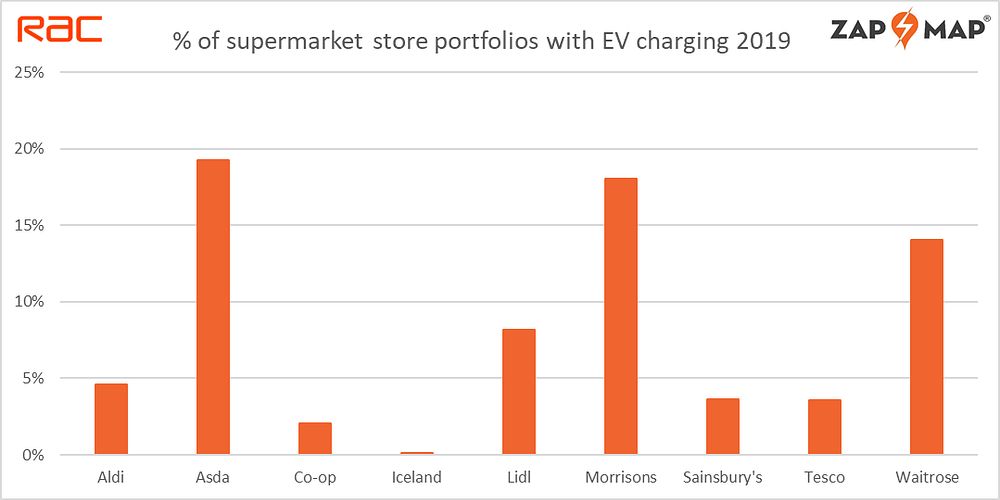
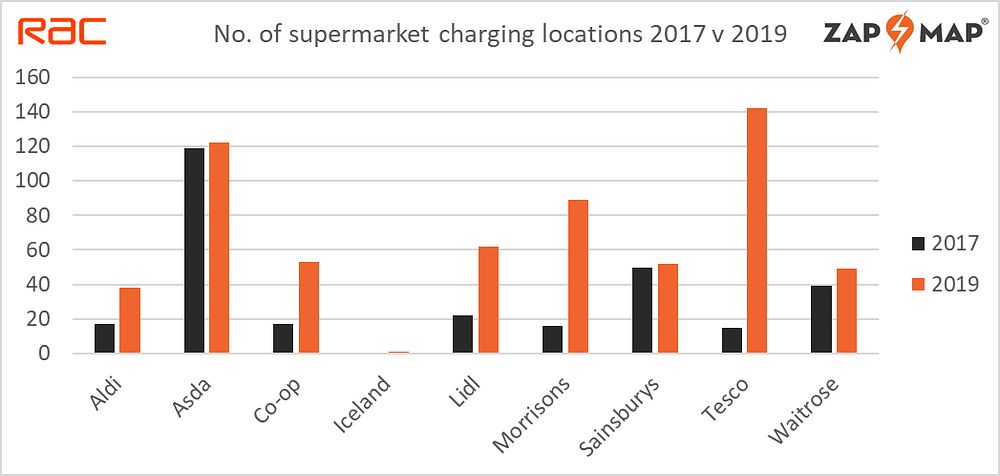
Asda and Morrisons have the greatest proportion of stores with charge points
From 2017 to 2019, the proportion of the UK’s 11,979 supermarkets which have EV charging facilities has increased from 3% to 5%. When looking at each supermarket’s store portfolios Asda has the greatest proportion of locations where an EV can be charged – 122 of its 633 sites (19%). Morrisons is in second spot with EV charging available at 89 of its 494 stores (18%), while Waitrose comes in third place with 14% – 49 of 349 stores.
While Tesco currently only has 4% of stores with charging capability, it has highest total number of stores with charging facilities (142 of 3,961 stores). It should also be pointed out that many supermarket chains particularly Tesco, Sainsbury’s, Iceland and Co-op have stores in city or town centre locations which do not have car parks, therefore skewing the ‘charge point by store’ percentage significantly.
Tesco has the most supermarket charge points
Not only does Tesco have the most stores with charging facilities, it is also the supermarket brand that has increased the number of charge points the most between 2017 and 2019, adding 258 to take its total to 281 by the end of 2019 – this means a quarter (25%) of all supermarket charge points are at Tesco. Asda has 228 charging units, but it only installed eight in the two years from 2017 (3% increase) – this means it has a fifth (20%) of all supermarket charge points.
Morrisons, Co-op, Lidl and Aldi have all also seen double-digit growth. Morrisons installed 83 charge points giving it 143 in total, Co-op 68 (88 in total), Lidl 48 (76 in total), Aldi 40 (72 in total), and Sainsbury’s 27, making for a total of 139 chargers.
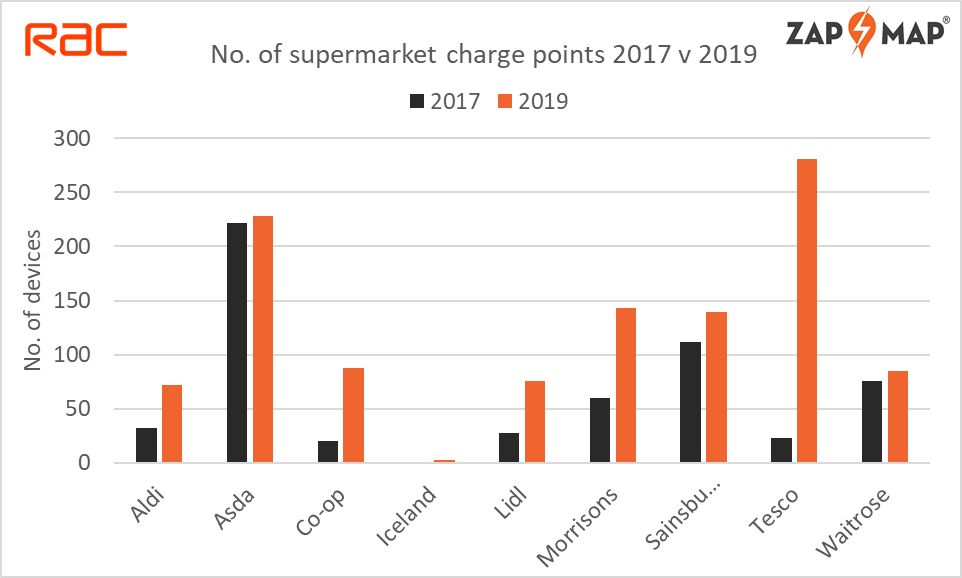
Morrisons, followed by Lidl dominate rapid charging at supermarkets
Currently, 15% of supermarket charge points are capable of fastercharging known as ‘rapid charging’. Morrisons leads the way here with 84 rapid chargers, making for 59% of its total number of chargers. Lidl is second with 63% of its 76 units (48) equipped with rapid charging. Co-op is in third with 18% of 88 chargers (16) capable of delivering its EV-owning customers with a rapid charge. Asda and Tesco which dominate EV charging generally at supermarkets are lagging behind in the rapid stakes with one and two chargers respectively.
Zap-Map and RAC reaction to findings
Melanie Shufflebotham, co-founder of the UK’s leading charging point platform Zap-Map, said: “It is very encouraging to see supermarkets increasingly embracing electric vehicle charging at their stores with a dramatic shift in the number of chargers being installed over the course of the last two years.
“Our research shows that while the majority of charging is done at home, most EV drivers use the public network more than once a month***. While a robust rapid infrastructure across the country is essential for longer journeys, having charge points in supermarkets provides EV drivers an excellent way to ‘graze‘ energy while doing an everyday task.
“With 89% of EV drivers*** taking the availability of charge points into account when selecting their parking, providing charging can be a real differentiator locally in the competitive supermarket sector. This seems to be recognised by some supermarkets, notably Tesco and Sainsbury’s, providing EV charging for free.”
RAC spokesman Simon Williams said: “It is extremely positive to see the supermarkets making it easy for drivers to go electric. Having more chargers that are readily available will help to speed up the transition from petrol and diesel cars to electric ones.
“We have always said that it makes sense for people to be able to charge at supermarkets because anyone doing a full shop will inevitably spend 45 minutes in store. The UK’s big four supermarkets currently dominate fuel retailing so it will be very interesting to see if a similar battle will develop in EV charging.
“At the moment the emphasis seems to be very much on installing any form of charge point. It is our belief that as the EV market matures there will be less need for slower chargers and a greater need for higher-power ones. The introduction of more rapid chargers at supermarkets may even stimulate take-up now as it would make EVs viable for those who cannot charge at home because of where they live. Currently, it seems that rapids are very much in their infancy at supermarkets, but hopefully this is all about to change.
“Very positively, new car sales figures reveal that three times as many BEVs were registered in January 2020 as were in January 2019.”
Research conducted for the RAC Report on Motoring**** shows the number of drivers who say they will choose an electric car as their next vehicle has doubled with 6% of motorists – the equivalent of more than 2.5m drivers** – saying they intend to buy a pure electric battery-powered car when their existing vehicle needs to be replaced, compared to 12 months ago.
Car industry data***** shows there are now more than 100,000 battery electric vehicles (BEV) on the UK’s roads and more than 170,000 plug-in hybrids.
The RAC is leading the way in EV roadside assistance by offering drivers complete peace of mind via its EV Boost mobile charging units which give a top-up to out-of-charge vehicles. It has also developed the All-Wheels-Up recovery system which is deployed from the back of a standard RAC van to provide the equivalent of flatbed recovery, thereby enabling patrols to tow broken-down EVs which could not otherwise be towed on two wheels.
Topics
Categories
Notes to Editors
* Data taken from the Zap-Map Database of public charging points: the 2017 data was from 13 November 2017 where there was a total of 7,986 devices of which 573 were located in supermarkets (7.2% of total) and the 2019 data was from 31 December 2019 when there was a total of 16,960 devices of which 1,115 were located in supermarkets (6.6% of total). Growth in supermarket charge devices between the two periods was 95% while the overall growth of charge devices was 112%.
** While this is a slight decline on the 2017 figure of 7.2% it is explained by the 112% rise in public charge points generally (7,986 in 2017 to 16,960 in 2019).
*** Research for the Zap-Map EV Charging Survey 2019 was conducted in June 2019 and carried out in-house. In total 1,718 EV drivers completed the online survey which took around 20 minutes to complete. Full results of the survey can be found on Zap-Map website.
**** Research for the RAC Report on Motoring 2019 was carried out by Quadrangle. In total 1,753 UK motorists (i.e. those who hold a full, current driving licence, drive at least once a month and have a motor vehicle in their household) were surveyed between 23 May and 3 June 2019, with the questionnaire taking around 30 minutes to complete.
***** Society of Motor Manufacturers and Traders – EV registrations: https://www.smmt.co.uk/category/news/registrations/evs-afvs/.As of Q3 2019 there were 32,973,200 licensed UK cars VEH0101.
About the RAC
The RAC provides complete peace of mind to 12m UK private and business drivers, whatever their motoring needs. Its services include:
- Breakdown assistance. Its highly-skilled, 1,600-strong branded patrol workforce attends more than two million breakdowns every year, fixing on average four out of five vehicles at the roadside. The RAC’s patrol fleet is one of the most advanced in the world, and was the first to roll out both an All-Wheels-Up recovery system, allowing the vast majority of vehicles to be recovered from a single patrol van, and EV Boost mobile electric vehicle charging units
- Insurance. The RAC is a top-five car insurance broker having surpassed the 500,000 policies-in-force milestone in 2018. It also offers ‘black box’ telematics policies, as well as home and travel insurance
- Other motoring services. The RAC leads in the development of new solutions for business, fleets, electric vehicles and future car technology. Its additional products and services include a personal loans offering, a used car buying website, vehicle inspections and checks, legal services or up-to-the-minute traffic and travel information. It also has a network of Approved Dealers and Approved Garages which combine the trust of RAC brand with local service and convenience
The RAC also works to support the interests of its members and UK drivers on the most important motoring issues which it identifies via the annual RAC Report on Motoring and the RAC Opinion Panel. The Report on Motoring is the longest running analysis of driver opinion in the UK having been published every year since 1989.
For more information about the RAC, visit the RAC website.


